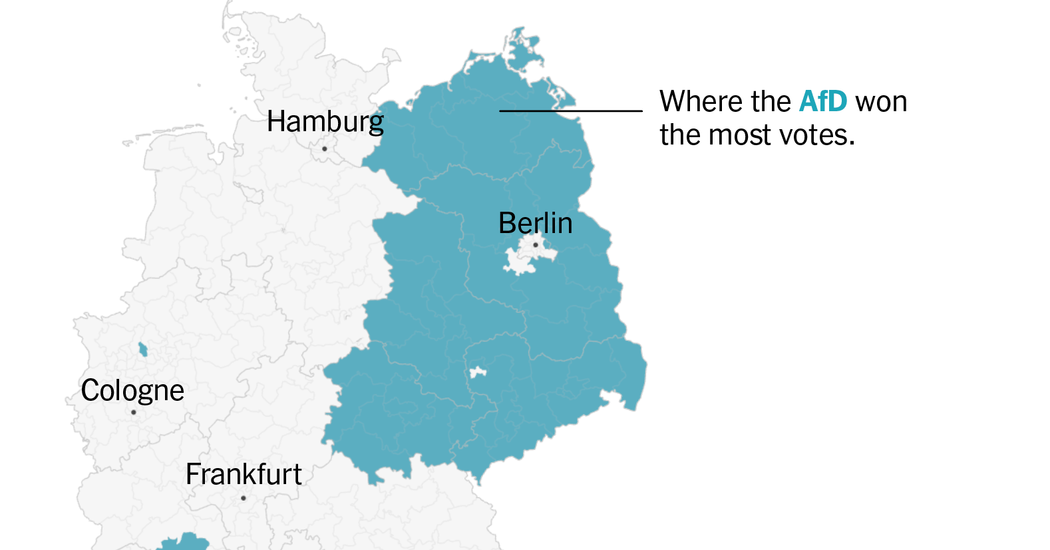Three and a half decades after reunification, a line runs through Germany where the Iron Curtain once stood. Instead of barbed wires and dogs, that line now divides Germans by measures like income and unemployment — and increasingly by the willingness to vote for extremist parties.
If East Germany were still its own country, the hard-right Alternative for Germany, or AfD, which has been linked to neo-Nazis and is being monitored by domestic intelligence, would have scored a convincing win in the elections on Sunday, with nearly one in three voters there casting ballots for it.
Only two of 48 voting districts outside of Berlin in the former East Germany were not won by the AfD. In a handful of districts in the east, the AfD got nearly 50 percent of the vote.
That division — and the sense that Germans still to some degree inhabit two separate worlds, east and west — has become a persistent feature of Germans’ voting habits. It is one that was manifest not only on Sunday but also when Germans voted in elections for the European Parliament last June.
The divide, analysts say, reflects not only a failure to fully integrate the east, but also its unique problems and culture, shaped by decades of Communist rule during the Cold War and close alignment with Moscow and the former Soviet bloc.
“One important aspect of this is that many East Germans have never really connected emotionally or mentally with West German democracy,” said Benjamin Höhne, a political scientist who studies eastern Germany.
On top of that, many of the metrics where eastern Germany still lags behind the western part are the very factors that make voters more likely to vote for the far right, Mr. Höhne said. The AfD also has close links to Moscow.
On Sunday, only 42 percent of Germans in the east voted for traditional West German parties, including the Social Democrats and Christian Democrats, which look likely to form a governing coalition.
The rest voted either for the AfD, Die Linke, which itself is a successor of the old Socialist Party that ran the East for nearly four decades, and a small splinter party run by a former Communist.
“The old western parties were never that well established in East Germany,” said Matthias Quent, a sociologist professor who has spent years studying the extreme right.
In the former East, the AfD is increasingly visible. Many members are active in civil society — including several mayors — which means even people who do not vote for the party come in regular contact with it, Professor Quent said.
“East Germany simply works differently and has not become more like the rest of the country either,” he said.
Given that East Germans were not allowed to vote freely for four decades before 1990, it is perhaps unsurprising that they do not feel the same attachment to western parties, experts say.
On top of that, parties called the Christian Democrats, Social Democrats or Liberal Democrats — like those in the West — existed in the old East Germany, but were not actual opposition parties because they were controlled by the communist regime.
It’s a narrative that allows the AfD to claim that it is the only real alternative to mainstream politics.
The result on Sunday was not a surprise. The vote tally in the east mirrored state elections in three eastern races in September.
In Thuringia, where Björn Höcke, who has been fined by a court for recycling Nazi language, runs the party, 33 percent voted for the AfD in September. The mainstream Christian Democrats came in a distant second place with about 24 percent of the vote.
However, when compared to neighboring countries, the more unusual part of the country is maybe the west, not the east.
“By European standards, the party landscape in eastern Germany is more the norm, while western Germany, with its still relatively stable mainstream parties, is actually the exception,” Professor Höhne said.
It is a problem not lost on mainstream politicians in Berlin, who see their support eroding in the east and worry that it could be a harbinger of what’s to come for the whole of Germany.
Friedrich Merz, the presumptive future chancellor of a center-right government, acknowledged the severity of the lopsidedness of German voting habits when he spoke to reporters a day after winning the national vote.
“We are extremely concerned about what is happening in the east,” Mr. Merz said.
To bolster the fortunes of mainstream parties, Mr. Merz plans to address problems both with irregular migration, which has been the AfD’s favorite issue, and with economics, as Germany struggles to improve competitiveness.
“We have to work together to solve the problems in Germany to gradually deprive this party of its fertile ground,” he said of the AfD.
Mr. Merz would be the first Christian Democratic chancellor since Angela Merkel, who was the first and so far only chancellor raised in East Germany.
And while the two parts of the country have become more integrated, high-level politics have not. Of the 17 government ministers in the departing cabinet of Chancellor Olaf Scholz, two were born in East Germany — and there might be even fewer in Mr. Merz’s.


